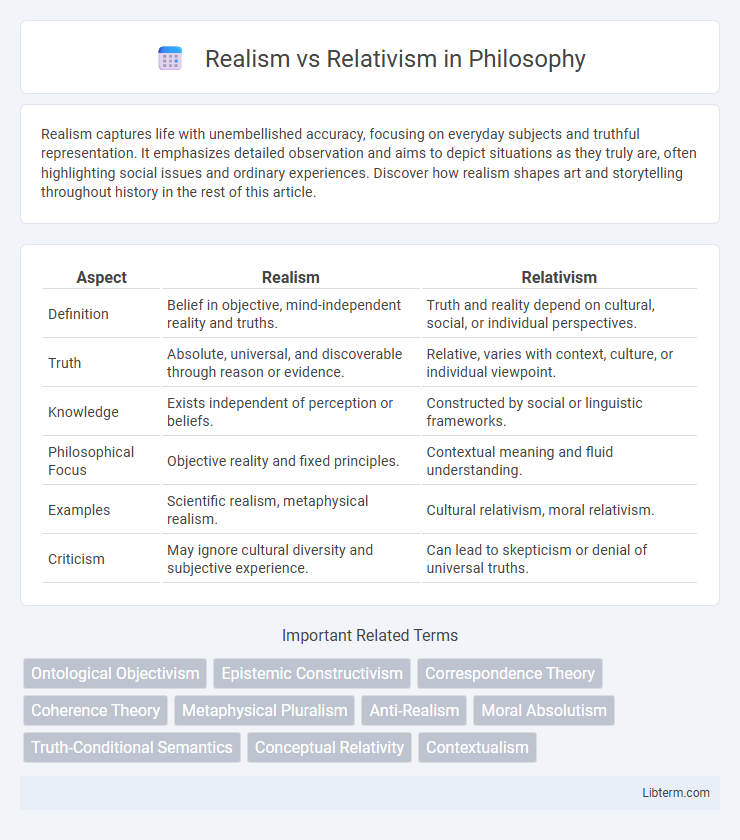Realism captures life with unembellished accuracy, focusing on everyday subjects and truthful representation. It emphasizes detailed observation and aims to depict situations as they truly are, often highlighting social issues and ordinary experiences. Discover how realism shapes art and storytelling throughout history in the rest of this article.
Table of Comparison
| Aspect | Realism | Relativism |
|---|---|---|
| Definition | Belief in objective, mind-independent reality and truths. | Truth and reality depend on cultural, social, or individual perspectives. |
| Truth | Absolute, universal, and discoverable through reason or evidence. | Relative, varies with context, culture, or individual viewpoint. |
| Knowledge | Exists independent of perception or beliefs. | Constructed by social or linguistic frameworks. |
| Philosophical Focus | Objective reality and fixed principles. | Contextual meaning and fluid understanding. |
| Examples | Scientific realism, metaphysical realism. | Cultural relativism, moral relativism. |
| Criticism | May ignore cultural diversity and subjective experience. | Can lead to skepticism or denial of universal truths. |
Understanding Realism: Core Principles
Realism asserts that an objective reality exists independently of human perception, grounding knowledge in observable phenomena and facts. Core principles include the belief in an external world governed by consistent laws, the existence of truth as correspondence between statements and reality, and the mind-independent nature of entities. This philosophy emphasizes empirical evidence and logical reasoning to uncover universal truths beyond subjective interpretations.
Defining Relativism: Key Concepts
Relativism asserts that truth and moral values are not absolute but vary depending on cultural, historical, or personal contexts, challenging the notion of universal standards. Key concepts include cultural relativism, which holds that ethical norms are culture-specific, and epistemic relativism, which suggests knowledge is influenced by individual or societal perspectives. This framework contrasts with realism, which posits objective truths existing independently of human beliefs or interpretations.
Historical Development of Realism and Relativism
Realism emerged during the Renaissance as scholars emphasized objective reality and universal truths, contrasting medieval scholasticism's reliance on theological frameworks. Relativism gained prominence in the 19th and 20th centuries through the influence of philosophers like Friedrich Nietzsche and Hans-Georg Gadamer, who argued that knowledge and truth are culturally and historically contingent. This historical development reflects a shift from asserting fixed, absolute truths toward recognizing the role of perspective and context in shaping understanding.
Ontology: Reality and Existence Debates
Realism asserts that reality exists independently of our perceptions or beliefs, positing that entities have objective existence regardless of human cognition. Relativism challenges this, arguing that reality and existence are contingent upon cultural, social, or individual perspectives, denying a fixed, absolute ontology. The debate centers on whether external reality is discoverable and constant or context-dependent and variable, significantly impacting metaphysical and epistemological frameworks.
Epistemology: Objective Truth vs. Contextual Truth
Epistemology debates Realism as the stance that objective truth exists independently of human perception, emphasizing universal and unchanging facts. Relativism argues that truth is contextual, shaped by cultural, historical, or individual perspectives, making knowledge provisional and situation-dependent. This contrast highlights the tension between fixed ontological realities and fluid interpretative frameworks in the pursuit of knowledge.
Realism in Science and Philosophy
Realism in science asserts that the external world exists independently of our perceptions, and scientific theories aim to accurately describe this objective reality. Philosophical realism upholds that objects, properties, and truths exist independently of our minds or beliefs, supporting a correspondence theory of truth. This stance contrasts with relativism by emphasizing stable, mind-independent facts that science seeks to discover through empirical evidence and rational inquiry.
Cultural and Moral Relativism Explored
Cultural and moral relativism emphasize that ethical values and norms are shaped by cultural contexts, suggesting no absolute moral truths exist beyond societal frameworks. Realism, in contrast, asserts that moral facts are objective and independent of human beliefs or cultural differences. This debate highlights the tension between universal ethical standards and culturally specific moral practices.
Major Criticisms of Realism and Relativism
Realism faces criticism for its assumption of objective truths independent of human perception, often overlooking cultural and contextual factors influencing knowledge. Relativism is criticized for potentially leading to epistemic nihilism, where the denial of universal truths undermines meaningful discourse and ethical standards. Both perspectives encounter challenges in balancing the search for objective knowledge with the acknowledgement of diverse interpretations and experiences.
Realism vs Relativism in Contemporary Debates
Realism in contemporary debates asserts that objective truths exist independent of human perception, grounding knowledge in an external reality that remains constant across contexts. Relativism challenges this by emphasizing that truth and moral values are contingent upon cultural, social, or individual perspectives, denying universal standards. This ongoing discourse shapes discussions in epistemology, ethics, and science, influencing interpretations of facts, norms, and reality.
Implications for Ethics, Society, and Knowledge
Realism asserts that moral and ethical truths exist independently of human beliefs, grounding ethics in objective standards that guide societal norms and knowledge claims. Relativism challenges this by positing that ethical values and truths are contingent on cultural, social, or individual perspectives, leading to diverse moral frameworks and pluralistic societies. The tension between these views impacts the foundation of legal systems, educational curricula, and epistemological approaches by shaping whether universal principles or contextual understanding dominate.
Realism Infographic

 libterm.com
libterm.com